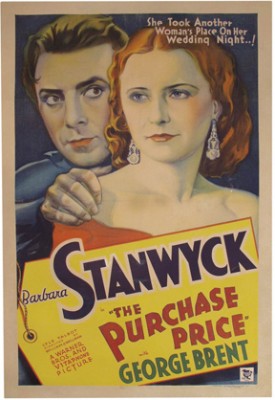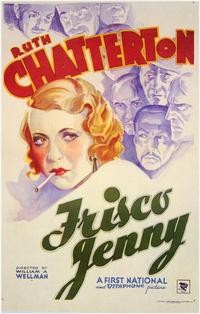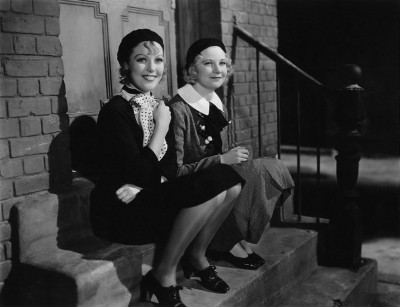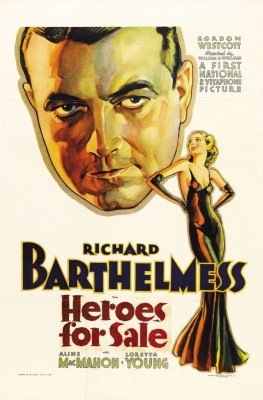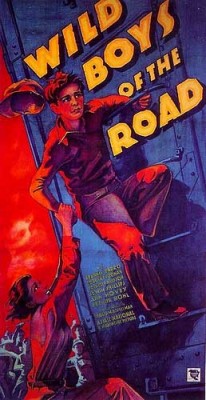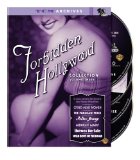| Reviews & Columns |
|
Reviews DVD TV on DVD Blu-ray 4K UHD International DVDs In Theaters Reviews by Studio Video Games Features Collector Series DVDs Easter Egg Database Interviews DVD Talk Radio Feature Articles Columns Anime Talk DVD Savant Horror DVDs The M.O.D. Squad Art House HD Talk Silent DVD
|
DVD Talk Forum |
|
|
| Resources |
|
DVD Price Search Customer Service #'s RCE Info Links |
|
Columns
|
|
|
Forbidden Hollywood Three (Other Men's Women/Purchase Price/Frisco Jenny/Midnight Mary/Heroes for Sale/Wild Boys of the Road)
More so than Volumes One and Two, Forbidden Hollywood Collection - Volume Three is packed with quality extra features: besides the usual collection of contemporaneous short subjects and newly-recorded audio commentaries, this set comes with not one but two feature-length Wellman documentaries, including the excellent Wild Bill: Hollywood Maverick.
Other Men's Woman exemplifies the films' surface shortcomings and significant value when you stay with it. Initially, this film seems little more than a very conventional and old-fashioned romantic melodrama about a love triangle. Locomotive engineers Bill (Grant Withers) and Jack (Regis Toomey) are lifelong pals, but then hard-living, no-good Bill falls in love with Lily (Mary Astor), Bill's nurturing wife, and the close relationship among all three is threatened.
After a slow start, the stakes for everyone involved are raised considerably; the film climaxes with a spectacular flood and efforts by the self-destructive, self-loathing Bill, overcome with guilt and shame, to drive a long line of flat cars on a bridge hoping the added weight will keep the bridge from being washed away. Though the use of miniatures in this sequence is fairly obvious, it's very exciting nonetheless.
Better still is Wellman's use of train yard locations; even the diners where the engineers eat seems authentic and not a set. Some of this footage is really terrific, especially as the storm builds and a blinded Jack feels his way around the train yard (with proto-noir lighting), eventually reaching its roundhouse. If you're a steam locomotive enthusiast, this movie's for you.
Though Grant Williams (several years before he was reduced to playing Mr. Wong's sidekick over at Monogram) and Regis Toomey aren't particularly impressive, Mary Astor positively glows. Though chiefly remembered today for her later career roles (in The Maltese Falcon, The Palm Beach Story, Meet Me in St. Louis, etc.) during this period, the late-silent/early-talkie era, she was extremely beautiful and unusually naturalistic in her performances.
James Cagney and Joan Blondell have significant supporting parts, with Blondell especially making a strong impression as Bill's coffee shop waitress girlfriend. (Train yard worker Cagney has a funny bit removing his grimy work coveralls, revealing an immaculately-tailored tuxedo underneath.) Walter Long, speaking in his normal voice (quite a contrast to the deep, intimidating one he always used as the villain in Laurel & Hardy's shorts), appears near the end as "Roundhouse" Bixby. (*** 1/2)
The Purchase Price is a real oddity, with Barbara Stanwyck's Joan Gordon a big city torch singer fleeing bootlegger and racketeer Eddie Fields (Lyle Talbot). She makes her way to Montreal, and after learning that plain-looking hotel maid Emily (Leila Bennett) secretly used a glamorous photograph of Joan's in the process of becoming a mail-order bride, Joan herself decides to go in the maid's place.
The husband-to-be, wheat farmer Jim Gilson (George Brent), lives in bitterly cold rural North Dakota, on a dingy, isolated farm miles from the nearest hick town. Initially Joan only wants to lay low for a while, to bide her time somewhere her old boyfriend would never think of looking for her. For this reason she spurns her new husband's wedding night advances, leaving him perplexed and bitter even as, over time, Joan winds up falling for him while adapting surprisingly well to the harsh farm life.
Twenty-five year old Stanwyck is mesmerizing and sexy (the film includes a gratuitous strip scene of Joan in her silk undies). The mixture of that Brooklyn accent of hers combined with a feminine fragility (in her early films) is ideally suited here. She's sympathetic even when the audience disapproves of her dishonesty toward Jim, and her efforts to please him and work hard on the farm are engrossing. The mood of the film is closer to something like Kurosawa's No Regrets for Our Youth (1946) or Terrence Malick's Days of Heaven than the usual pre-Code Warner Bros. movie.
But it's also an oddball kind of picture that doesn't really work; the rural folk are caricatures, almost Ma & Pa Kettle-like, and Brent is never believable as the earnest farmer dreamy-eyed about growing "the best wheat in the world!" (***)
Frisco Jenny is a big step up, with Ruth Chatterton the daughter of a disreputable Tenderloin saloon keeper in 1906 San Francisco. When her fiancé and father are killed in the great San Francisco earthquake, she becomes homeless and gives birth to an out-of-wedlock son, Dan, in the remains of Chinatown with the help of her loyal Chinese friend, Amah (Helen Jerome Eddy, about as Chinese as Flora Robson).
After she and her baby nearly starve to death begging for chump change with the Salvation Army, Jenny rebuilds her fortune in the vice trade, providing women for rich men's parties. At one of these, crooked lawyer Steve Dutton (Louis Calhern) kills a man (an uncredited though instantly recognizable J. Carroll Naish), but Jenny covers Steve's tracks and though implicated in the murder, she's never charged. However, the scandal forces her to surrender her toddler son to a rich and "respectable" couple for several years. And from here, matters go from bad to worse. A lot worse.
Though awfully depressing Frisco Jenny has many reasons to recommend it. The big earthquake is spectacularly filmed with some amazing miniatures (which must have been quite huge, actually) and special optical effects; though not quite as epic as the quake in MGM's 1936 San Francisco it comes impressively close. It's intriguing also to consider that, when it was new, the film's early scenes would have been set just 26 years in the past, a not-too-distant memory for many in the audience. Though 1906 seems like, well, 103 years ago now, in 1932 it was for audiences then what a movie set in 1983 would be for us today.
The depiction of that era's vices is neither romanticized nor scorned; the film basically doesn't pass judgment on Jenny's willingness to do whatever it takes to feed her son and build a new life for herself - an attitude the Production Code would in no way have permitted just a few years later. (Spoilers) The argument could be made that the film's tragic, bitterly ironic ending - a genuinely emotionally devastating one that must have left 1932 audiences shell-shocked - could have permitted such a film to be made post-1934, but I doubt it. The picture is emphatically on Jenny's side, no matter her bootlegging and procuring.
Chatterton (Madame X, which this resembles, and Female) is very good; she does most of her acting by reacting to others; she's okay with dialogue, but a master of expression with her eyes. (Though stylistically very different, she seems to have been a big influence on Bette Davis.)
Wellman's direction is solid and impressively frank and authentic throughout, though he gets a little overly arty in a courtroom scene, where instead of cutting from one close-up to another, he employs a swish-pan/cut throughout. Though undeniably novel, the effect is like watching an episode of Perry Mason from inside a Tilt-A-Whirl. (****)
After Frisco Jenny, Midnight Mary plays like a very compromised, very MGM-ified and phony telling of the same basic story, 25-odd years in the hard-luck life of a woman who becomes involved with criminals to stay alive - she's a victim of circumstance and bum raps - only to be condemned by a sanctimonious public.
Loretta Young stars as Mary Martin, an orphan who out of desperation begins prostituting herself at 17, and who while still underage becomes involved with gangster Leo Darcy (Ricardo Cortez). A key scene exemplifying the difference between this and Frisco Jenny happens early on: when Darcy surprises her with a $50 bill for being the unwitting lookout in a robbery, the guilt-ridden Mary drops the money in a Salvation Army bucket, even though this means being evicted from her rooming house that same evening for non-payment of rent. Jenny, on the other hand, would've snatched up that dough in a heartbeat.
Mary eventually meets attorney Tom Mannering, Jr. (Franchot Tone), the son of a famous judge. The two fall in love, and she gets him to send her to secretarial school, and later gets a "decent" job as a stenographer at his law offices. Darcy, meanwhile, is not happy about these developments.
20-year-old Loretta Young is young and beautiful (and is that really her playing Mary at the age of...nine?!), but she's totally unbelievable as a hardened gangster's moll. She is supposed to be someone who never quite fits in with that crowd, illustrated by her awkward relationships with cruel, unsophisticated Darcy and his uncouth cohorts (Una Merkel, Warren Hymer, Harold Huber, and assistant director-turned-actor Sandy Roth), but she never once has that hardened quality Ruth Chatterton expressed so expertly. Partly this is also due to Anita Loos' overly hard-boiled dialogue; in another crucial scene, Mary is collared by a cop, and rather than allow Tom Mannering to become involved she suddenly turns on him, blowing off his affections with a lot of tough-talkin' hooey that rings totally false.
But like the other films in this set, Midnight Mary has many fine qualities. There's a nice little touch about a painting Mary remembers fondly from childhood; the original coincidentally turns up in Mannering's home like an omen of good fortune. One character dies with his eyes disturbingly wide open, in a look of frozen shock; Mary's hardships are neatly expressed in one montage by her ripped stockings.
The film has an interesting structure, with Mary recalling her life while awaiting the jury's verdict in small, volume-filled court clerk's (The Wizard of Oz's Charlie Grapewin) office. Besides Mary's underage escapades, other pre-Code salaciousness includes an scene near the end where Mary, trying to calm down her hot-headed gangster boyfriend, attempts to lure him into the bedroom by, obviously, whispering explicit sexual acts into his ear that the audience cannot hear. (***)
Heroes for Sale is the real eye-opener, an at times gut-wrenching tale of multiple tragedies in the life of a self-sacrificing war veteran who becomes an almost Christ-like symbol of the Common Man. The great silent film star Richard Barthelmess is Tom Holmes, who's left for dead on the front lines while Roger Winston (Gordon Westcott), paralyzed with fear, makes it back with the German officer Holmes captured. Winston is awarded the Distinguished Service Cross and promoted while Holmes spends the remainder of the war in a German P.O.W. camp in perpetual agony with shrapnel splinters embedded in his spine.
The war over, Winston returns home a Big Hero, while Holmes becomes addicted to morphine sympathetic Germans prescribe to ease his agonizing pain. Winston gets him a job at his father's bank, but the sanctimonious elder Mr. Winston (Berton Churchill) cruelly condemns Holmes who winds up in a sanitarium and, eventually, is left homeless.
He moves to Chicago, into a boarding house for the poor run by kindly old maid Mary Dennis (Aline MacMahon in an excellent performance) and whose denizens include a didactic Communist inventor, Max Brinker (Robert Barrat), laundress Ruth (Loretta Young), and Mary's kind if irresponsible father (Charles Grapewin). Holmes gets a job at Ruth's laundry service company, where the two fall in love and where his honest ambition impresses the company's president (Grant Mitchell). But can their happiness last?
Heroes for Sale is a really terrific movie that's all over the place. Early scenes are grim and realistic about the horrors of World War I - and the transfer is so good one can really feel the texture of the cold and muddy trenches - and the almost worse treatment these hard-luck veterans receive upon their return by a society disinterested in healing their wounds. Later on, the film covers a lot of ground from the exploitation of the worker by greedy capitalists (played by Hollywood's two great specialists in such roles, Edward Arnold and Douglass Dumbrille) to, conversely, the hypocrisy of many American communists.
Though Max, a character that condemns capitalism until one of his inventions makes him rich, is primarily comical, he seems to be offsetting the film's core heart-on-its-sleeve socialism and plainly pro-FDR sentiment toward the end. The picture has its early Capra/Riskin elements - Holmes coming into money but giving it all away to feed the hungry masses - but the film's biggest strengths, and surprises, are its unrestrained fury toward powerful men with no regard for the workers chiefly responsible for making them wealthy and powerful in the first place.
Near the end of the film there's a great and incredibly ironic twist I won't give away here, except to say that it's as relevant in today's economy as it was in 1933 when Heroes for Sale was new. Indeed, while the film fascinates as a document of its tumultuous era (there are billboards declaring "Jobless Men Keep Going...We Can't Take Care of the Our Own," the sort that really existed during the Great Depression, and which anticipate Steinbeck's The Grapes of Wrath), so much of it has come full circle and will strike a chord with modern viewers. (**** 1/2)
Wild Boys of the Road tells a similar tale less realistically, maybe partly because of the growing optimism about FDR's programs, maybe because the filmmakers felt it necessary to pull back a bit in a film about homeless teenagers. At times it threatens to become Andy Hardy's Depression Troubles, but several grim scenes jerk it back into reality.
The film stars the compact but talented and prolific Frankie Darro, whose numerous eclectic credits include a major role in the bizarre Gene Autry serial The Phantom Empire and the voice of Lampwick in Disney's Pinocchio. Just 15 when this was made, he plays Eddie Smith, who seems to be enjoying an idyllic middle-class existence until his father (Grant Mitchell) is laid-off and soon thereafter threatened with eviction from their home. Eddie and best pal Tommy Gordon (Edwin Phillips, also very good) decide to ride the rails in search of a work so they can send money home to their parents, but only find misery.
Early on, they hook up with Sally (Dorothy Coonan, later Wellman's wife) who's bumming her way to Chicago to surprise her aunt, but when the aunt turns out to be a brothel madam and arrested for prostitution, there's little they can do but wander from city to city in search of a job.
The stylized acting by the kids and some of the dialogue keep reminding the audience they're watching a movie and not a documentary, though Darro and the others aren't overbearing like MGM's Mickey Rooney often was, and Darro is excellent throughout. One great scene early on has him trying to help out the old man by selling his beloved jalopy to a junk dealer who'll rip it apart and sell it for parts. Though heartbroken, he tries to convince Dad he never much cared for the car, but each reads the other's feelings and the scene is emotionally powerful.
The film is peppered with Strong Stuff; in one scene a brakeman (an uncredited Ward Bond) rapes a homeless teenage girl in a boxcar. Later the kids beat him and he falls off the train to his death. Like Heroes for Sale, the film wears its heart on its sleeve, particularly in the blatant but effective dénouement, where the three teens are brought before a sympathetic judge (Robert Barrat, the Communist inventor from Heroes for Sale). There's a too-obvious pan up to a National Recovery Act poster above him, but Tommy's line is another gem that resonates today: "You read in all the papers about giving people help. The banks get it...what about us?" (****)
Video & Audio
The six features, all in their original full frame aspect ratios, look great, with exceptionally clean transfers given their age, and apparently all except Midnight Mary were sourced from their original nitrate camera negative. Blacks are strong, there's a pleasing film grain texture to most; even the title elements are frequently pristine. The shorts are less impressive, transfer-wise, and the 1995 Wild Bill documentary (see below) actually looks worst of all, surprisingly enough.
The mono audio is fine; English and French subtitles are included on all six features.
Extra Features
The films in this set are all accompanied by their original trailers. Five early black & white cartoons are included; they aren't anywhere near the level of either Disney or the Fleischer's cartoons of the same period, but they're okay. One of these, the Cinecolor Bosko's Parlor Pranks, is a Harman-Ising short featuring a shameless rip-off of Mickey Mouse's dog Pluto; except for a few black patches, "Bruno" is damn near identical. The really amazing one though is saved for the end, One Step Ahead of My Shadow, set in China (though there's a Japanese presence, too). Imagine every racist or uninformed stereotype times ten - to give you some idea, in one scene a character plays a Chinaman's buck teeth like a xylophone, and in another two men talk like Amos & Andy.
More intriguing are three S.S. Van Dine Detective shorts, two-reel whodunits starring that unforgettable crime-solving team of Donald Meek and John Hamilton (Superman's Perry White). These shorts, The Wall Street Mystery, The Studio Murder Mystery, and The Trans-Atlantic Mystery (the latter featuring Ray Collins as a murderer) are all pretty fun, like the later streamlined B-mysteries studios were just beginning to crank out in the early 1930s (with Charlie Chan, etc.). The Pete Smith short Goofy Movies #1, actually assembled by (later Three Stooges) director Jules White, is funnier than the usual Pete Smith agony.
The big guns though are two lengthy Wellman shows. Wild Bill: Hollywood Maverick is a feature-length documentary biography; Wellman's incredible life story is one well worth telling, and the show is positively packed with A-list stars and other heavyweights. It's one of the best cinema documentaries around. Also included is The Men Who Made the Movies: William A. Wellman, featuring a vintage interview with the filmmaker.
Finally, informative audio commentaries accompany three of the films: Jeffrey Vance and Tony Maietta talk about Midnight Mary, John Gallagher discusses Heroes for Sale, and William Wellman, Jr., and Frank Thompson are on-hand for Wild Boys of the Road. These tracks are quite good, and it's a pleasure to hear some fresh talent on these tracks for a change.
Parting Thoughts
Though hit-and-miss, the best films in this Forbidden Hollywood Collection are outstanding while the weakest ones have their moments - and the documentary Wild Bill all by itself is almost worth the price of admission. This is another terrific set, for fans of classical Hollywood cinema this is a DVD Talk Collector Series title.
Film historian Stuart Galbraith IV's latest book, The Toho Studios Story, is on sale now.
|
| Popular Reviews |
| Sponsored Links |
|
|
| Sponsored Links |
|
|
| Release List | Reviews | Shop | Newsletter | Forum | DVD Giveaways | Blu-Ray | Advertise |
|
Copyright 2024 DVDTalk.com All Rights Reserved. Legal Info, Privacy Policy, Terms of Use,
Manage Preferences,
Your Privacy Choices | |||||||









